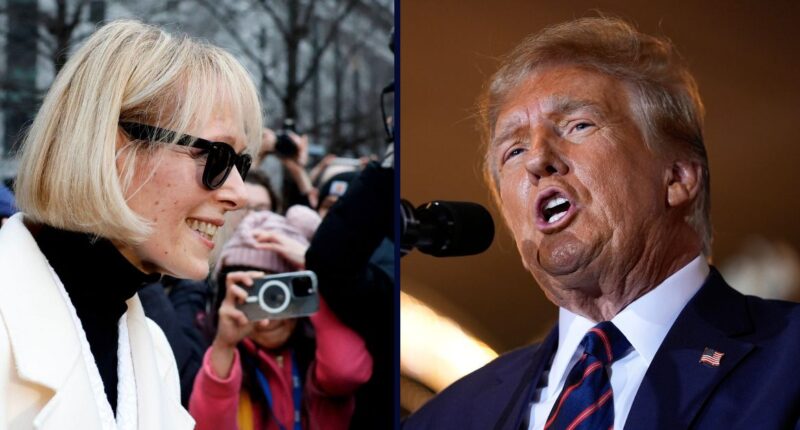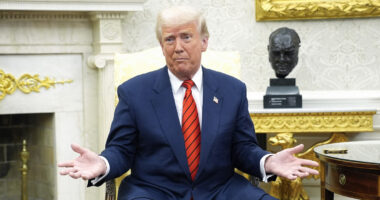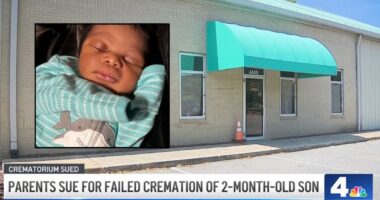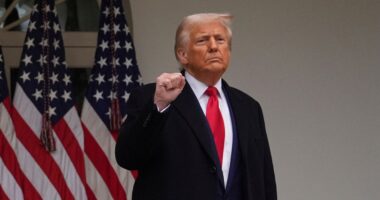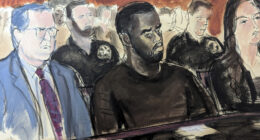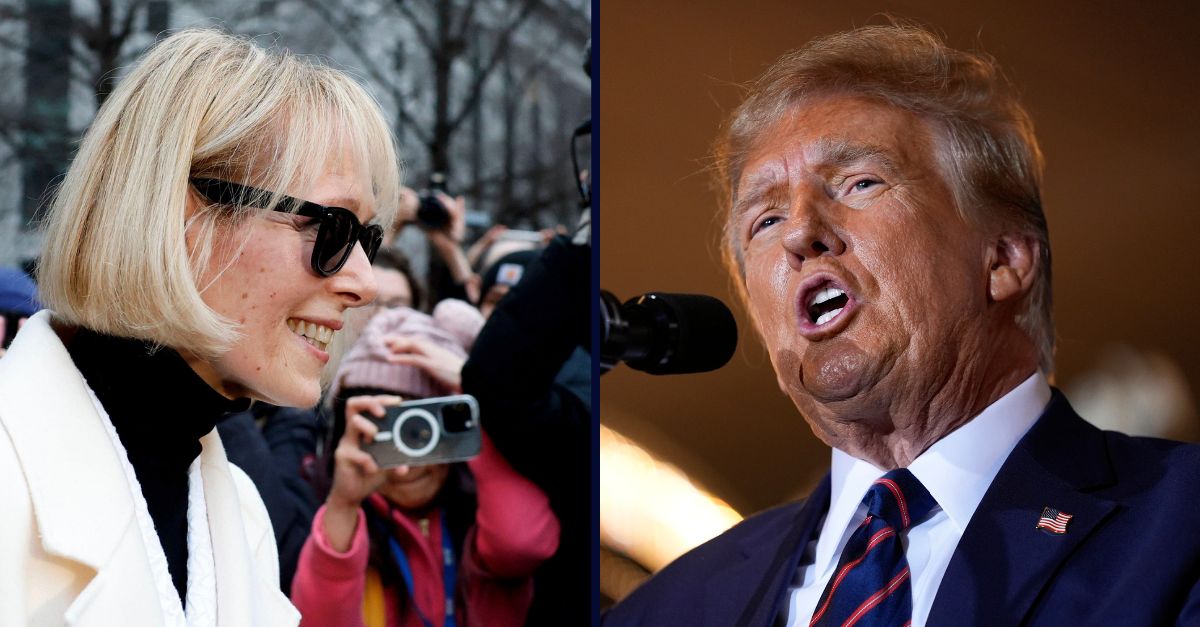
Left: Journalist E. Jean Carroll departs from the courthouse after the conclusion of the damages trial against Donald Trump at Manhattan Federal Court on Friday, January 26, 2024 in New York City (John Angelillo, Alamy Live News via AP). Right: Republican former President Donald Trump speaks at a primary election night party in Nashua, N.H., Jan. 23, 2024. (AP Photo/Matt Rourke).
A federal appeals court has upheld the multimillion-dollar award granted to writer E. Jean Carroll in her defamation case against Donald Trump.
“On review for abuse of discretion, we conclude that Mr. Trump has not demonstrated that the district court erred in any of the challenged rulings,” a panel of three judges from the 2nd U.S. Circuit Court of Appeals ruling, issued Monday, says. “Further, he has not carried his burden to show that any claimed error or combination of claimed errors affected his substantial rights as required to warrant a new trial.”
As Law&Crime has previously reported, a civil jury in May 2023 found Trump liable for sexually abusing Carroll in the 1990s and for defaming her when denying the allegations decades later while president. The New York jury had found that Trump sexually abused Carroll in the dressing room of New York City department store Bergdorf Goodman sometime in the late 1990s — and later defamed her when denying both the allegations and that he ever knew her. The case ended in a $5 million damages award, which Trump appealed, alleging that U.S. District Judge Lewis A. Kaplan “erred” in rulings regarding certain evidence.
Specifically, Trump argued to the appeals court judges, Kaplan should not have allowed jurors to hear testimony from two women, Jessica Leeds and Natasha Stoynoff, who said that Trump had sexually assaulted them. Leeds had described in a deposition Trump’s alleged sexual assault of her on an airplane in the 1970s, while Stoynoff, a writer and journalist, alleged that Trump had assaulted her in 2005 when she was at Mar-a-Lago to interview him and his wife, Melania Trump.
Trump also objected to Kaplan’s decision to allow the jury to hear the audio recording of what is now known as the “Access Hollywood” tape, in which Trump is heard describing to TV host Billy Bush how he would grab women by their genitals without their consent and kiss them.
U.S. Circuit Judges Susan L. Carney, a Barack Obama appointee, and Myrna Perez, a Joe Biden appointee, along with Senior U.S. Circuit Judge Denny Chin, also an Obama appointee, did not find Trump’s arguments persuasive, and they found no error on the part of Kaplan.
“In 1978 and 1979, just as it is now, it was a federal crime to commit a simple assault on an airplane,” the judges wrote. “And on this record a jury could have reasonably found that Mr. Trump committed a simple assault against Ms. Leeds.”
The judges said that the women’s testimony along with the “Access Hollywood” audio were properly put before the jury.
“[T]he jury could reasonably infer from Ms. Stoynoff’s testimony and the Access Hollywood tape that Mr. Trump engaged in similar conduct with other women — a pattern of abrupt, nonconsensual, and physical advances on women he barely knew,” the ruling said. The judges noted that the standard for admitting this type of testimony at trial is only “whether a jury could reasonably find by a preponderance of the evidence that a person committed the attempted assault,” which is “distinct from and less stringent than the standard for convicting a person criminally of assault or attempted assault, which would have required the jury to make this finding beyond a reasonable doubt.”
While the judges acknowledged that they were “not fully persuaded” by Kaplan’s ruling that the “Access Hollywood” tape amounted to a “confession,” they were satisfied that admitting it at trial “was evidence of one or more prior sexual assaults,” and was therefore “provided a proper basis for the district court’s exercise of its broad discretion.”
According to the judges (citations omitted):
We conclude that the Access Hollywood tape described conduct that was sufficiently similar in material respects to the conduct alleged by Ms. Carroll (and Ms. Leeds and Ms. Stoynoff) to show the existence of a pattern tending to prove the actus reus, and not mere propensity. Mr. Trump’s statements in the tape, together with the testimony of Ms. Leeds and Ms. Stoynoff (detailed above), establish a repeated, idiosyncratic pattern of conduct consistent with what Ms. Carroll alleged. In each of the three encounters, Mr. Trump engaged in an ordinary conversation with a woman he barely knew, then abruptly lunged at her in a semi-public place and proceeded to kiss and forcefully touch her without her consent. The acts are sufficiently similar to show a pattern or “recurring modus operandi.” Moreover, the tape was “directly corroborative” of the testimony of Ms. Carroll, Ms. Leeds, and Ms. Stoynoff as to the pattern of behavior each allegedly experienced, and “the matter corroborated” was one of the most “significant” in the case — whether the assault of Ms. Carroll actually occurred.
The judges also rejected Trump’s claim that jurors should have heard evidence that Carroll’s legal fees were paid by a political opponent. Trump argued that this evidence was “proof that a billionaire critic of President Trump had paid [Ms. Carroll’s] legal fees, and that [Ms. Carroll] lied about the funding during her deposition,” and that he should be allowed to use it to attack Carroll’s credibility.
“The facts established during the ensuing discovery confirmed that Ms. Carroll’s case was taken on a contingency fee basis, and that, in September 2020, Ms. Carroll’s counsel received outside funding from a nonprofit to help offset costs,” the ruling said. “There was no evidence to suggest that Ms. Carroll was personally involved in securing the funding, interacted with the funder, received an invoice showing the arrangement before or after her counsel received the outside funding, or had discussed the arrangement with anyone between learning of it in September 2020 and being deposed in October 2022.”
“It was not an abuse of the district court’s discretion to conclude that the available litigation-funding evidence would have little probative value compared to its potential for unfair prejudice,” the judges added.
“Mr. Trump’s arguments on this point rely on a mischaracterization of the record. The district court permitted extensive questioning on cross-examination of Ms. Carroll regarding her decision not to go to the police, and the court allowed the introduction of extrinsic evidence on this very point,” the ruling says. “By the time Mr. Trump’s counsel reached this question, Ms. Carroll had already responded to at least ten questions regarding her decision not to file a police report … The district court was well within its discretion to bar further cumulative questioning.”
A separate defamation lawsuit brought by Carroll, known as Carroll I, resulted in an $83 million defamation award.
“Both E. Jean Carroll and I are gratified by today’s decision,” Robbie Kaplan said in a statement. “We thank the Second Circuit for its careful consideration of the parties’ arguments.”
Lawyers for Trump did not immediately respond to Law&Crime’s request for comment on the ruling.
